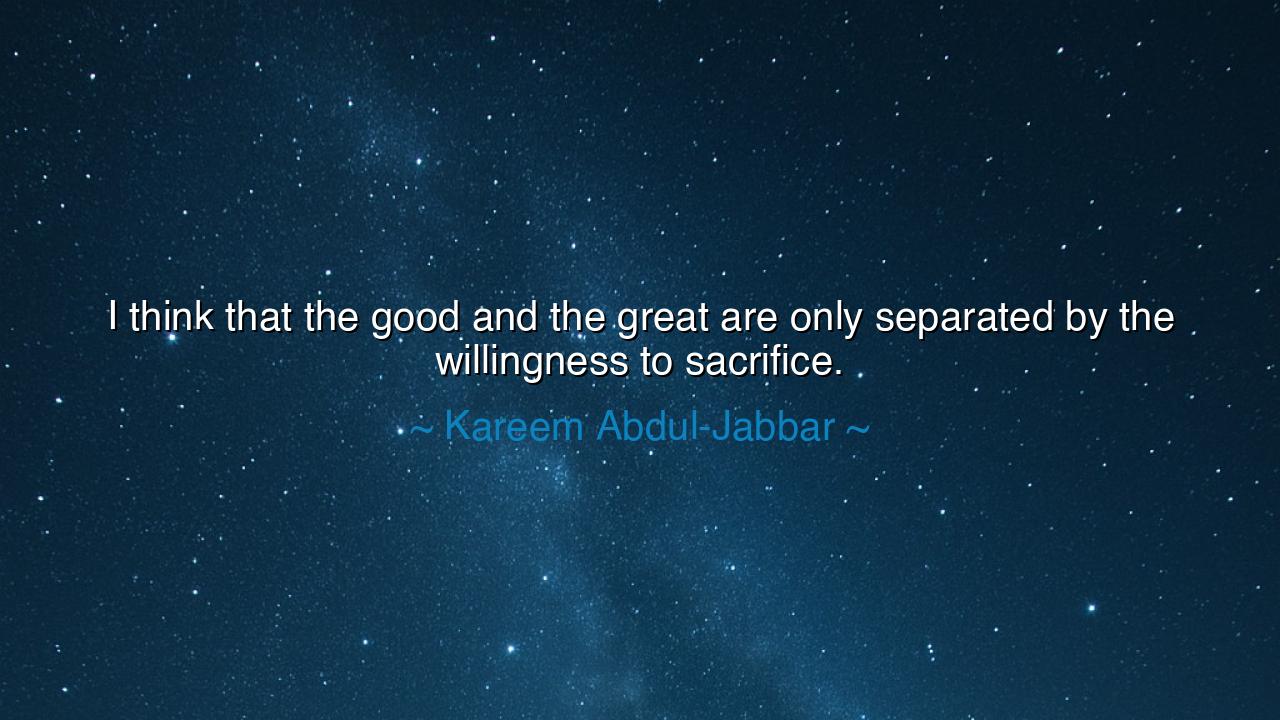
I think that the good and the great are only separated by the
I think that the good and the great are only separated by the willingness to sacrifice.






Hear, O seekers of greatness and bearers of ambition, the immortal words of Kareem Abdul-Jabbar, who declared: “I think that the good and the great are only separated by the willingness to sacrifice.” In these few words lies a truth older than time itself—the law that greatness is not born of talent alone, but of the price one is willing to pay. For the distance between the good and the great is not measured in skill, but in endurance, not in comfort, but in sacrifice.
Abdul-Jabbar spoke from the summit of a life forged in discipline and struggle. On the surface, his words reflect the world of sport, where champions rise through sweat, pain, and perseverance. Yet beneath that surface lies a deeper wisdom: that all human achievement—whether in art, science, faith, or leadership—demands surrender. To reach the heights of greatness, one must first lay down the ease of ordinary life. Sacrifice is the bridge between aspiration and attainment, between what we wish for and what we become.
Consider the story of Leonidas, king of Sparta, who at Thermopylae faced the vast army of Persia with only three hundred men. He knew he would die; yet he stayed, not for victory, but for honor—for the preservation of freedom. In his death, he taught the world that true greatness is measured by what one is willing to lose, not what one can gain. Leonidas could have lived as a “good” king, but he chose instead to die a great leader, for greatness always demands the offering of self upon the altar of purpose.
In his own way, Abdul-Jabbar lived by that same creed. While others sought glory in applause, he pursued excellence in solitude. He changed his name, his beliefs, and his life’s direction, sacrificing fame for integrity and peace for principle. He trained beyond exhaustion, studied beyond curiosity, and played beyond pain. His words arise from that furnace of endurance—where comfort burns away, leaving only the pure metal of character.
The ancients would have called this the path of arete—the pursuit of excellence through moral and physical struggle. To the Greeks, virtue and greatness were one, and both required sacrifice. The farmer who toiled before dawn, the philosopher who questioned until his last breath, the artist who gave his soul to his work—they all understood that to live nobly was to sacrifice the trivial for the timeless. It is a law written into the nature of existence: the seed must die for the tree to live.
But take heed, O reader: sacrifice is not suffering for suffering’s sake. It is the willing exchange of the lesser for the greater. To give up laziness for mastery, pride for wisdom, pleasure for purpose—this is the sacred transaction that transforms the “good” into the “great.” The good live comfortably; the great live meaningfully. The good avoid pain; the great use it as fire.
Therefore, let this teaching guide your path: choose what is hard when it serves what is higher. When others rest, rise. When others yield, persist. Sacrifice not because you must, but because you can—because within every person lies the capacity for greatness, waiting to be awakened by commitment.
Thus, the words of Kareem Abdul-Jabbar endure like the echo of a temple bell: greatness is not an inheritance, but an offering. It belongs to those who dare to give up comfort for conviction, mediocrity for mastery, the easy path for the eternal one. For in the end, all glory fades—but the spirit of sacrifice remains, a light that guides the hearts of those who strive to become not merely good, but truly great.






AAdministratorAdministrator
Welcome, honored guests. Please leave a comment, we will respond soon